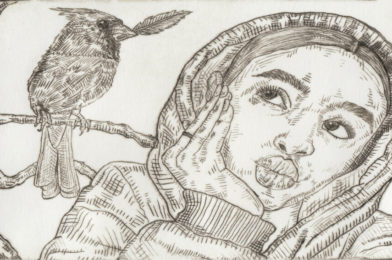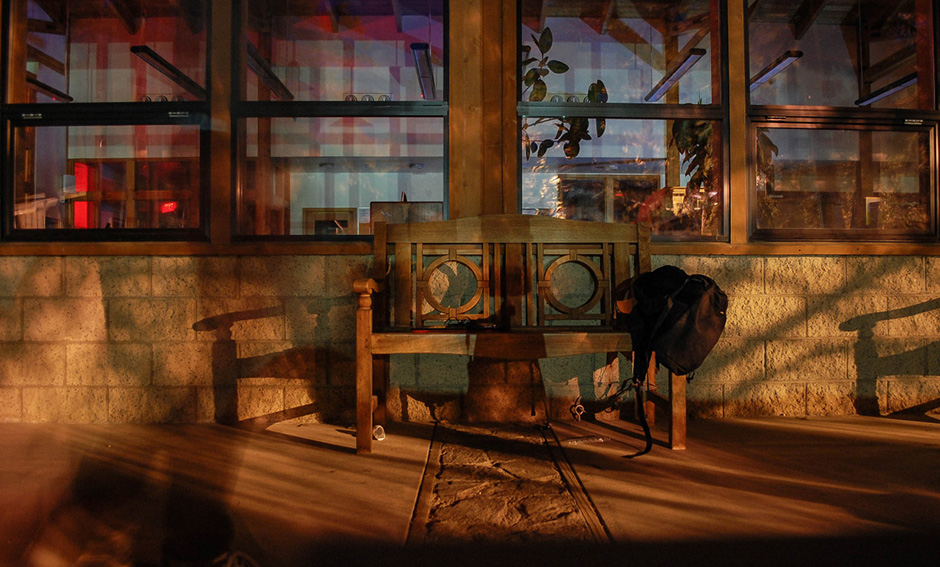Welcome to the Galapagos!
‘Tis the season of freshly cracked eggs and budding miconias, so spring forward and send your fledglings here for the finest education in the ecosystem. We teach the finches of tomorrow everything from how to nibble around the nectarine pit to how to tell a radish from rhubarb. Best be sure that your chicks will realize their true wingspan.
Hullo, Hunter.
Oh!
Is that for show and tell?
Your special toy must fit in a lunchbox—
bang
Survival of the Fittest
Not a chirrup from Ms. Darwin. She has a bullet in her gizzard.
Babes, spread your wings! Downy puffs lick conifer-scented oxygen as the flock departs
from the nest, the survival instinct kicking in.
The farthest only makes it a couple yards before his spiderweb bones snap under the
currents. The rest scatter, frisking from branch to twig to twig to branch, frantic to bilk the hunter. Flying—Ms. Darwin hadn’t covered this in class. Just yesterday they were still practicing tail feather coordination.
Quick, find a hollow gnarl. (Cabinets, cupboards.)
The birdbrains disappear into clusters of leaves. (Quilts, desks.) To be fair, what choice do they have?
Trees only have so many knots.
Jay
The art cabinet is Jay’s domain. The waxy scent of crayons soothes his nerves as he holds his breath like a vendetta, trying to erase the image of Ms. Darwin on the nylon carpet, unmoving, unblinking.
Last September, she had elected him the Art Materials Official. Every day Jay follows through with his duty, scrubbing off leftover acrylic, testing the ink intensity of the markers. The good-for-nothings are tossed out. And of course, the most important task of all: sharpening each of the crayons in the twenty-four packs.
Cerulean—his favorite. He uses it to color everything.
One day, Jay will be a famous artist! World famous! His aunt might finally look up from her blue Skittles. Imagine, a museum gallery with his drawings of a
cerulean giraffe
cerulean—
The cabinet hinge whines.
bang
Efron
His pterodactyl print shirt camouflages with the cornucopia of backpacks. Smart boy. The hunter’s graphite eyes slip right over him.
He knows his shapes. A square is most certainly not a trapezoid. He knows a fish from a mammal. A shark and a bottlenose, respectively. He even knows a sliver of subtraction, how to borrow the one, et cetera.
Efron knows everything about death. Every Sunday, the deacon rambles and ambles about the same old as his unhemmed robes scrape the tiles, punishing the marble for its mere existence.
For all his efforts, daily Psalms recitations won’t buy his ticket to heaven. Apparently, certain types already have designated fire-pits. Still. There is a boy whose favorite crayon is cerulean…
Red paint dribbles from the art cabinet, the drip-drops distinct from the outside April shower.
Efron knows everything about death. The classroom is a collage; thumb through the pages yourself. It reeks of iron and is as silent as divine intervention.
After his expiration date, he has eternity to spend being barbecued in his private fire-pit. Why rush it?
So, while the hunter surveys his yield, checking every nook and cranny for strays, Efron abandons his place, soaring at godspeed.
Past the doorframe.
Hunter
Now, Hunter has a keen ear for Eminem
Bartók
and squeaky sneakers.
Efron
A microcosm of comatose autos, mostly Fords and Toyotas. Chipped lacquer flashes in silver daylight, urging him to hurry through buttery puddles though his socks may dampen. The hunter is on the go.
There! Up ahead, near the patchwork of wire, a familiar stegosaurus in all its yellow glory. Twice a day it tromps to his cul-de-sac. If he asks nicely, would the stego offer refuge?
The east wind carries him over, hurrying him behind the stego’s hulking body. Shivering in cloud tears, he prays.
Hunter
Behind a school bus tire, rubber soles play
peek-a-boo.
Efron
Sirens grieve in red and blue. Matchbox cruisers pioneer down the trail at more than twenty-five miles an hour. Answered prayers? Efron’s spirits lift.
The hunter slinks around the corner, tool in hand, the kind reserved for lions and tigers and bears. And kindergarteners, evidently.
Efron falls back. Wet concrete scrapes his palms as his heart wracks his ribcage.
Muzzle, meet forehead.
Instead of praying, he says, “Please don’t,” to a different kind of deity. Blasphemy? Who
cares. Efron simply doesn’t want to die.
A long pause. “One good reason, kid,” he says, baritone stifled by his knit mask. His
trigger finger slackens.
“I’ll go to hell,” he tells him in a beat. “Deacon Eric said I’ll go to hell where I’ll rot in
fire-pits because I’m unclean and I still need to get rid of—”
bang bang bang
Natural Selection
The hunter drops his toy and crumples, a soggy paper doll. Efron emerges, the lone finch.
Evolutionists coin this “natural selection”.
Welcome Back to the Galapagos!
Once again, ‘tis the season of freshly cracked eggs and budding miconias, and parent finches are still springing forward to send their babes here to realize their true wingspan. Fledglings learn how to nibble around the nectarine pit; how to tell a radish from rhubarb.
But recess is spent in code-red lockdowns. They realize their true wingspan is, in fact, as flight-effective as cotton wads. They learn to arm themselves with safety scissors; how to blitz hunters with Dr. Seuss hardcovers.
Certainly, a fair fight against an AK-47.
Quick, scribble letters to Mother Finch and Father Finch. Apologies for bad behavior. Farewells, snuggles and pecks, miss you’s and love you’s. Binder paper decorated with tear stains, signed in rickety letters.
One hundred and eight written today. Thirty-one last words.
Hatchlings, finches, welcome to the Galapagos! Hunters are out of hibernation, so beware of rifles and razor mesh. In each nest, scout for the best hiding spot and stay near it at all times, just in case. Efron, dearest finchling, one year down, twelve to go.
Welcome to the Galapagos!
Avalon Felice Lee is an Asian-American sixteen-year-old sophomore at Notre Dame San Jose High School. She has been writing prose since the age of eleven, thanks to her author-mentor-mother. When not writing, she’s probably practicing cello, assaulting the ears of nearby victims. When she grows up, she wants to be an author. And a millionaire.
Art by Baslel Addisu



